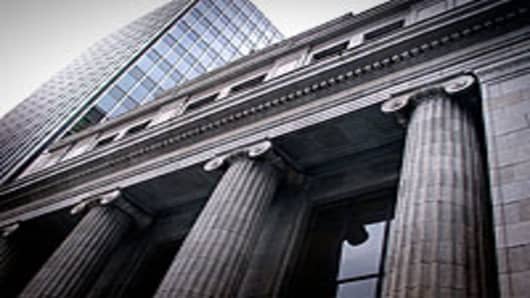While investors in major indices have been pricing in the end of the recovery, bank investors appear to be pricing in the end of the world.
That has been the case since the sector hit its April highs and then sold off more than 30 percent since, despite ostensibly being awash in cash provided to it during the post-financial crisis liquidity infusions from the Federal Reserve .
"What you have at the moment is the market making the assumption that these companies aren't worth their liquidation value, even if their liquidation value is 100 percent in cash," said Dick Bove, vice president of equity research at Rochdale Securities in Stamford, Conn. "You have to ask yourself what is going on. Do they believe that the American banking industry is finished?"
"Basically if what the market is telling us about banks is correct, then we're heading toward a financial crisis which will cripple the American economy and all these stocks," he added in an interview.
Bove famously made the call nearly a month ago that the market was too volatile and investors should shed all their positions, including banks.
But even his mind was changed by the rapid-fire selling that, despite Tuesday's sharp rally, told him the banks had been beaten up enough and it is now time to get back in.
"You should be going in full bore and buying banks here, because the situation is not going to stay the way it is," Bove said. "I don't care how many idiots there are in Washington, I don't care how many people are trying to hoodwink everybody in Europe. The cash is there and it isn't going to sit there with no return."
A sharp increase of some $200 billion in deposits has analysts such as Bove convinced that banks have enough capital to withstand the bevy of factors conspiring against the industry. They include the torrent of foreclosures yet to hit the marketas the government has tried to forestall a seemingly inevitable conclusion to the housing crisis, as well as fallout from the European debt crisis and a sharp slowing in the U.S. economy.
At the focal point of the selling has been Bank of America , which is most exposed to the foreclosure crisis, including through allegations of improprieties in the way it handled its own cases.
BofA stock has tumbled more than 31 percent in the past month alone, taking its peers down for the ride as well.
Yet Credit Suisse analyst Mosche Orenbuch, even while taking down its price target for BofA from $17 to $14, said it "remains the cheapest bank in our coverage universe" and expressed optimism that the company would be able to meet capital requirements and weather the foreclosure storm.
That seems to be the overriding prognosis for the sector, even as the Keefe, Bruyette & Woods Bank Index has crumbled 32 percent since its April 6 high.
"The developing economic outlook of slowing U.S. growth coupled with a yield curve where the short end is zero for the indefinite future and the 10-year bond yield is below 2 percent is a very difficult environment for banks," said Fred Cannon, director of research and chief equity strategist at KBW.
"That said, this is an earnings issue for banks, not a liquidity or capital issue in the U.S.," he added. "The liquidity and capital issues in our view are being overdone. But there is a real legitimate concern of the ability of banks to earn money."
In BofA's case, the company could, for instance, sell its stake in China Construction Bank to raise much of the capital needed for Basel III and Dodd-Frank requirements.
Yet that has failed to assuage investor concerns.
"Bank of America seems to be dragging down a lot of the financials because of concerns about its capital position," Cannon said. "The reason the market is concerned is it is the weakest capitalized bank of the large financial institutions in the US....That said, when we look at the amount of liquidity resources, Bank of America is still in extremely strong shape."
It's not just BofA, though. Investor concerns shifted this week to Goldman Sachs , on news that CEO Lloyd Blankfein has hired a defense attorneyas Congress investigates whether the Wall Street titan violated laws during the financial crisis.
"Washington is now looking for scapegoats to the real estate fiasco it had itself created, and Goldman Sachs and Lloyd Blankfein make easy marks for politicians," Dennis Gartman, hedge fund manager and author of The Gartman Letter, wrote. "This is wrong."
Goldman's shares continued to fall Tuesday, after tumbling nearly 5 percent Monday, indicating how fragile the market's psyche is regarding the financials in particular.
Bove, though, said the problem is more with Blankfein than it is with Goldman.
"He's become an irritant to the stock price and shareholders," Bove said. "Let's assume he's not guilty of anything. But I'm not willing to make the assumption that he's operating with the degree of freedom that he operated with before all these potential lawsuits showed up."
The best of class in the big bank group continue to perform well—JPMorgan Chase in particular, which hasn't had to chart the same course as its peers. Credit Suisse's Orenbuch said recently that the bank is well-positioned thanks to "strength and stability of senior leadership team, strong capital levels, and competitive positioning."
As for the rest of the industry?
"We continue to believe you can make good investments today," KBW's Cannon said. "Some of the top-quality franchises have what look like good long-term returns without taking excessive long-term risks. We do think investors need to be way that earnings estimates, especially for 2012 and 2013, are going to be under some pressure."




